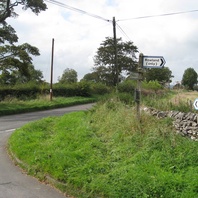
Viking Names
Rowland
Rowland, in the High Peak Hundred of Derbyshire, is a Scandinavian compound from Old Norse rá and Old Norse lundr ‘a small wood’. It is difficult to determine if the first element rá either means ‘a roe, a roe-buck’ or ‘a land-mark, a boundary’. The forms also show the common replacement of lundr with land which also happened in Hasland, Derbyshire.
Read More
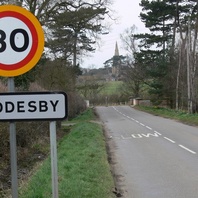
Viking Names
Gaddesby
Gaddesby, in the East Goscote Hundred of Leicestershire, is a Scandinavian compound from the Old Norse male personal name Gaddr, which is an original byname from Old Norse gaddr ‘a goad, a spur’, and Old Norse element by ‘a farmstead, a village’. Alternatively it has been suggested that the first element is Modern English gaddr transferred topographically to the ‘spur of land’ on which the settlement is located. However, it is difficult to conceive the escarpment in which the village sits on as a hill-spur.
Read More
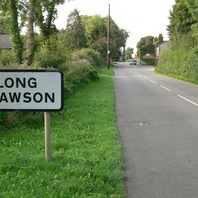
Viking Names
Long Clawson
Long Clawson, in the Framland Hundred of Leicestershire, likely comes from the Old Danish male personal name Klak (Old Norse Klakkr), an original byname probably meaning ‘a lump, a clod’. This personal name is frequently found throughout the Danelaw and occurs in other place-names such as Claxby, Lincolnshire, and Claxton, North Yorkshire. Alternatively, the first element has been suggested to be Old English clacc ‘a hill, a peak’. The second element is Old English tun ‘an enclosure; a farmstead; a village; an estate’. The village is variously described as in the Vale referring to the Vale of Belvoir, and since c. 155o the affix had been Long from Old English lang ‘long’ likely because the township is of linear formation and is approximately one mile in length.
Read More

Viking Names
Hasland
Hasland, in the Scarsdale Hundred of Derbyshire, is an Anglo-Scandinavian compound from Old English hæsel ‘a hazel-tree’ and Old Norse lundr ‘a small wood’. Earlier forms of the place-name such as Heselunt and Heslond show influence from Old Norse hesli ‘hazel-wood’.
Read More

Viking Names
Swithland
Swithland, in the West Goscote Hundred of Leicestershire, comes from Old Norse sviðinn ‘land cleared by burning’ and Old Norse lundr ‘a small wood’. Thus the place-name has the meaning of ‘the wood next to or containing land cleared by burning’.
Read More
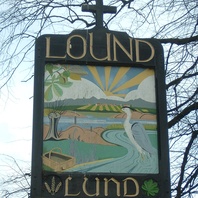
Viking Names
Lound
Lound, in the Bassetlaw Wapentake of Nottinghamshire, comes from the Old Norse element lundr ‘grove, wood’. This origin is celebrated on the village sign, and there is also a Grove Farm in the village.
Read More

Viking Names
Conisholme
Conisholme, in the South Riding of Lindsey in Lincolnshire, comes from Old Danish kunung ‘a king’ and Old Norse holmr ‘an island, an inland promontory, raised ground in marsh, a river-meadow’. The name is topographically appropriate, though what king is evoked by it is uncertain. However, the village of Coningsby, also in the South Riding of Lindsey, is recorded in Domesday Book as having been owned by the king.
Read More
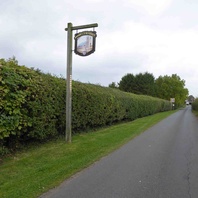
Viking Names
Fenby
Fenby, in the Haverstoe Wapentake of Lincolnshire, is an Anglo-Scandinavian hybrid from Old English fenn ‘a fen, a marsh, marshland’ and Old Norse by ‘a farmstead, a village’. It is most likely to be a partial Scandinavianization of an earlier Old English place-name, perhaps Fenton, with a similar meaning. Fenby is now a joint parish with Ashby, and the name survives in Fenby Farm, which lies in what must have been a fenny area on the lower slope of the Wolds.
Read More
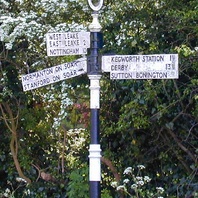
Viking Names
West Leake
West Leake, in Rushcliffe Wapentake of Nottinghamshire, is a simplex name from Old Norse lœkr ‘brook’. East and West Leake are on the banks of a small stream which joins the Soar at Kingston.
Read More
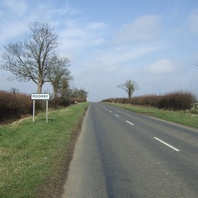
Viking Names
Moorby
The first element of Moorby, in the Horncastle Wapentake of Lincolnshire, is either Old English mor or Old Norse mór ‘a marsh; barren upland’ here in the sense ‘moor’. The second element is Old Norse bý ‘a farmstead, a village’. The village is on the slope of the Wolds.
Read More

Viking Names
Wigtoft
Wigtoft, in the Kirton (in Holland) Wapentake of Lincolnshire, is likely an Anglo-Scandinavian compound. The first element is uncertain, but it is probably Old Norse vík ‘a small creek, an inlet, a bay’. The second element is Old English toft ‘a curtilage, the plot of ground in which a dwelling stands’. Wigtoft is situated near Bicker Haven, which was formerly an arm of the sea.
